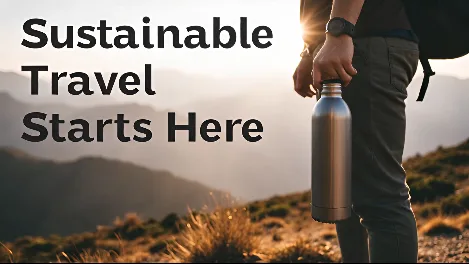The Ballad of Brenda and the “Eco-Conscious Journey” PDF

Ah, the “Sustainable Travel Digital Download.” A phrase that conjures images of enlightened beings floating across the globe, their carbon footprints lighter than a feather, their reusable water bottles gleaming in the sun. You’ve come to the right place. Pull up a chair, preferably one made from reclaimed pallet wood, and let me spin you a tale.
Our heroine, Brenda, was a modern-day explorer. Her battlefield wasn’t dragons’ lairs, but the treacherous landscape of modern travel. She was haunted by the specter of her own carbon footprint, a monstrous, invisible shadow that grew with every click on a budget airline website.
One fateful Tuesday, while doom-scrolling through a feed filled with pictures of glaciers calving and turtles with straws up their noses, she found it: The Holy Grail, the Digital Excalibur—the “Wanderlust Warrior’s Guide to Sustainable Travel: A Digital Download.”
“For only $19.99,” the ad crooned, “you can transform from a planet-killing tourist into an eco-conscious guardian of Gaia.” Brenda, her heart aflame with righteous purpose, clicked “Buy Now.” The PDF landed in her inbox with the silent, profound weight of a thousand recycled trees.
She opened it. The document was a masterpiece of beige backgrounds and tasteful leaf motifs.
Chapter 1: Packing Light. “A lighter suitcase means a lighter conscience!” it declared. Brenda, ever the disciple, spent three weeks agonizing over whether to pack her bamboo toothbrush or her charcoal-infused bamboo toothbrush. She eliminated five pairs of socks. “The planet thanks you,” the PDF seemed to whisper.
Chapter 2: Getting There. “Consider trains over planes! Embrace the slow journey!” Brenda lived in Kansas. Her desired destination was a small island in Thailand. She spent four hours researching a train route that would take her across the Pacific Ocean before remembering basic geography. She booked a flight, but she felt really bad about it, which the PDF assured her was the first step.
Chapter 3: On the Ground. “Eat local! Stay local! Breathe local!” Brenda arrived in Thailand. She immediately sought out the most authentic, hyper-local experience. She found a tiny, family-run restaurant. The family, sensing a golden opportunity, served her a “secret, traditional dish” that bore a striking resemblance to the frozen pizza they bought in bulk from the Tesco Lotus down the road. Brenda ate it with gusto, praising the “earthy tones” and “unpretentious presentation.”
The climax of her journey was a “Beach Clean-Up Retreat” she found through the PDF’s “Curated List of Ethical Operators.” For a mere $500, she spent a day picking up plastic bottles alongside twenty other Wanderlust Warriors, all of whom had flown in from various corners of the globe. The retreat was owned by a German venture capitalist. The T-shirts, made of “organic cotton,” were shipped from Bangladesh.
Brenda returned home, her digital guide completed, her conscience clear as a alpine spring. She had the PDF, she had the photos, she had the story. She had, in fact, done very little that was substantially different from any other tourist, but she had the documentation to prove her virtue. She was, according to her Instagram bio, a #SustainableTraveler. The planet, meanwhile, continued to spin, blissfully unaware of Brenda’s downloadable salvation.
And so, our heroine learned the greatest travel secret of all: the lightest thing you can pack is your own self-awareness, and the most sustainable journey is often the one you don’t take, but just read about in a comfortably air-conditioned room. A truly magical ending, don’t you think?
Antonio’s (Sarcastically Sustainable) Author Bio
Antonio is a writer, satirist, and professional skeptic who has journeyed to the far corners of his own living room and back again. His work has been featured in such prestigious publications as “The Journal of Questionable Intentions” and “The Daily Raise-An-Eyebrow.” He believes the most eco-friendly form of travel is a vivid imagination, which produces zero emissions and requires no pesky PDFs. He currently resides somewhere between a state of bemusement and utter disbelief. His bestselling digital download, “A Sarcastic Person’s Guide to Writing Author Bios,” is available for a limited time at a price that is frankly unreasonable.
Three Questions & Answers
1. So, are you saying sustainable travel is a complete scam?
- Answer: Oh, heavens no! That would be far too simplistic and, dare I say, unsustainable a position. I’m saying that slapping a “green” label on a PDF you sell to guilt-ridden tourists is about as effective as bailing out the Titanic with a teaspoon. Real sustainability is complex, difficult, and often inconvenient. It’s not something you can download; it’s something you have to actively, and often expensively, do.
2. What’s the most sarcastic travel tip you can give?
- Answer: Easy. Always book the window seat on a long-haul flight. This allows you to press your face against the glass, gaze directly upon the melting polar ice caps, and fully immerse yourself in the poignant, real-time consequences of your journey. It really adds a layer of profound depth to the in-flight movie.
3. Did Brenda’s story have a happy ending?
- Answer: Of course it did! She achieved the ultimate goal of modern travel: the curation of a personal brand. She got the content, the moral high ground (however shaky), and a lovely new leaf-motivated screensaver. The fact that the actual environmental impact of her trip was marginally different from a “non-sustainable” one is just a boring, pedantic detail. Don’t be a pedant. Be like Brenda.

















